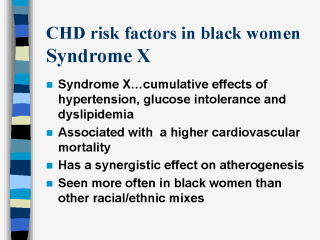 |
African American women may be
particularly vulnerable to CHD as a result of diabetes, not only because of their
increased prevalence relative to other race/gender mixes but also because of the
cumulative effects of hypertension, glucose intolerance and dyslipedemia, commonly known
as syndrome x (18). Persons with diabetes are also more likely to have hypertension and
dyslipidemia, both of which are associated with a higher cardiovascular mortality. This
syndrome has a synergistic effect on atherogenesis and is typically seen more often in
blacks, particularly black women (18). Diabetes has also been implicated as a possible
etiology of the increased incidence of CHD in young black women. Animal studies have
suggested that hyperglycemia and hyperinsulinemia-insulin resistence prevent the
cardiovascular protective effects of estrogen. Because black women have a higher incidence
of both diabetes and obesity relative to white women, this mechanism may eliminate the
protection from CHD that female sex normally provides (19). |
